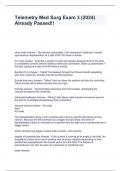Intranodal pathways - Study guides, Class notes & Summaries
Looking for the best study guides, study notes and summaries about Intranodal pathways? On this page you'll find 12 study documents about Intranodal pathways.
All 12 results
Sort by
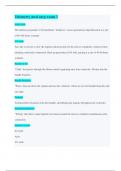
-
Telemetry med surg exam 3
- Exam (elaborations) • 23 pages • 2024
- Available in package deal
-
- $12.99
- + learn more
Telemetry med surg exam 3 Sinus node The intrinsic pacemaker. Cell membrane "leakiness" causes spontaneous depolarization at a rate of 60-100 times a minute. AV node Acts like a resistor to slow the impulse allowing time for the atria to completely contract before initiating ventricular contraction. Back up pacemaker if SA fails, pacing at a rate of 40-60 times a minute. Bundle of his "Cable" that passes through the fibrous sheath separating atria from ventricles. Divides into th...
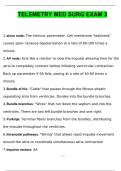
-
Medical Surgical Telemetry Exam 3 Questions with 100% Correct Answers | Verified | Latest Update 2024
- Exam (elaborations) • 29 pages • 2024
-
- $12.99
- + learn more
1. sinus node: The intrinsic pacemaker. Cell membrane "leakiness" causes spon- taneous depolarization at a rate of 60-100 times a minute. 2. AV node: Acts like a resistor to slow the impulse allowing time for the atria to completely contract before initiating ventricular contraction. Back up pacemaker if SA fails, pacing at a rate of 40-60 times a minute. 3. Bundle of his: "Cable" that passes through the fibrous sheath separating atria from ventricles. Divides into the bundle branches. 4....
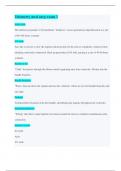
-
Telemetry med surg exam 3
- Exam (elaborations) • 23 pages • 2024
-
- $12.49
- + learn more
Telemetry med surg exam 3 Sinus node The intrinsic pacemaker. Cell membrane "leakiness" causes spontaneous depolarization at a rate of 60-100 times a minute. AV node Acts like a resistor to slow the impulse allowing time for the atria to completely contract before initiating ventricular contraction. Back up pacemaker if SA fails, pacing at a rate of 40-60 times a minute. Bundle of his "Cable" that passes through the fibrous sheath separating atria from ventricles. Divides into th...
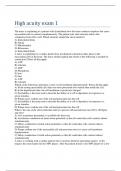
-
2024 LATEST High acuity NURSING exam 1
- Exam (elaborations) • 27 pages • 2024
-
- $11.99
- + learn more
The nurse is explaining to a patient with dysrhythmia how the heart conducts impulses that cause myocardial cells to contract simultaneously. The patient asks what structure allows this conduction from cell to cell. Which structure should the nurse mention? A) Intercalated disks B) Nuclei C) Mitochondria D) Ribosomes A) Intercalated disks A nurse is explaining to a cardiac patient how mechanical contraction takes place in the myocardial cells in the heart. The nurse should explain that ...
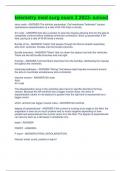
-
telemetry med surg exam 3 2023- solved
- Exam (elaborations) • 11 pages • 2023
-
- $11.49
- + learn more
sinus node - ANSWER-The intrinsic pacemaker. Cell membrane "leakiness" causes spontaneous depolarization at a rate of 60-100 times a minute. AV node - ANSWER-Acts like a resistor to slow the impulse allowing time for the atria to completely contract before initiating ventricular contraction. Back up pacemaker if SA fails, pacing at a rate of 40-60 times a minute. Bundle of his - ANSWER-"Cable" that passes through the fibrous sheath separating atria from ventricles. Divides into the bun...
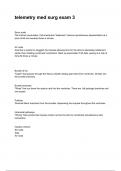
-
telemetry med surg exam 3 QUESTIONS AND CORRECT DETAILED ANSWERS WITH RATIONALES (VERIFIED ANSWERS) |ALREADY GRADED A+
- Exam (elaborations) • 15 pages • 2024
- Available in package deal
-
- $12.99
- + learn more
telemetry med surg exam 3 QUESTIONS AND CORRECT DETAILED ANSWERS WITH RATIONALES (VERIFIED ANSWERS) |ALREADY GRADED A+
Telemetry Med Surg Exam 3 (2024) Already Passed!!
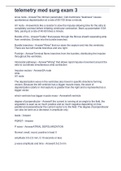
-
telemetry med surg exam 3 2022 with complete solutions.
- Exam (elaborations) • 11 pages • 2022
-
- $12.99
- + learn more
sinus node The intrinsic pacemaker. Cell membrane "leakiness" causes spontaneous depolarization at a rate of 60-100 times a minute. AV node Acts like a resistor to slow the impulse allowing time for the atria to completely contract before initiating ventricular contraction. Back up pacemaker if SA fails, pacing at a rate of 40-60 times a minute. 00:06 01:21 Bundle of his "Cable" that passes through the fibrous sheath separating atria from ventricles. Divides into the b...
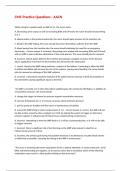
-
CMC Practice Questions - AACN - with verified answers
- Exam (elaborations) • 38 pages • 2023
-
- $7.99
- + learn more
CMC Practice Questions - AACN While caring for a patient with an IABP at 3:1, the nurse notes: A. decreasing urine output as well as increasing BUN and CR levels; the nurse should increase timing to 2:1 B. absent pulses in the proximal extremity; the nurse should apply pressure at the insertion site. C. blood in the IABP tubing; the nurse should disconnect the balloon catheter from the IABP. D. blood oozing from the insertion site; the nurse should anticipate the need for an emergency fas...
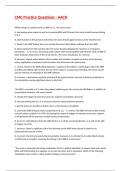
-
CMC Practice Questions - AACN - with correct and verified answers.
- Exam (elaborations) • 37 pages • 2023
-
- $7.99
- + learn more
CMC Practice Questions - AACN While caring for a patient with an IABP at 3:1, the nurse notes: A. decreasing urine output as well as increasing BUN and CR levels; the nurse should increase timing to 2:1 B. absent pulses in the proximal extremity; the nurse should apply pressure at the insertion site. C. blood in the IABP tubing; the nurse should disconnect the balloon catheter from the IABP. D. blood oozing from the insertion site; the nurse should anticipate the need for an emergency fas...

Did you know that on average a seller on Stuvia earns $82 per month selling study resources? Hmm, hint, hint. Discover all about earning on Stuvia



